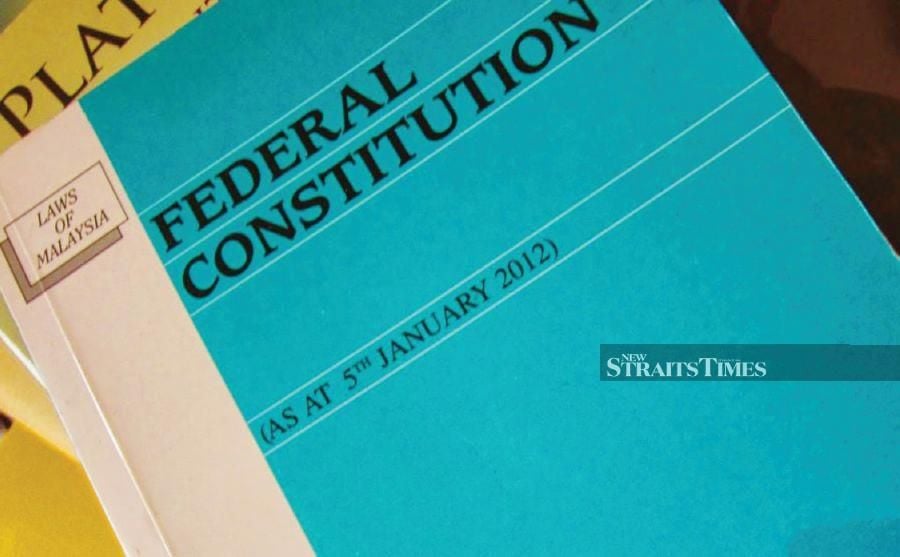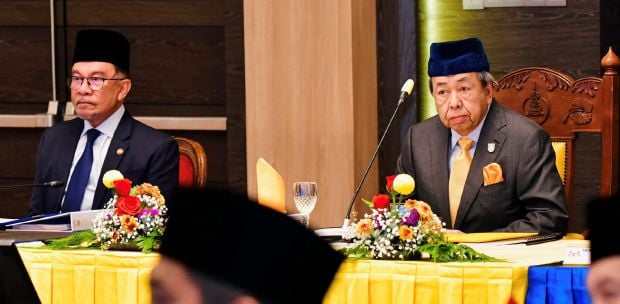CALLS have been made as far back as 10 years ago for the Federal Constitution to be taught in schools.
Every citizen, young and old, should know what the Federal Constitution contains as it sets out the legal framework and rights of all Malaysians.
Some parties have decided to renew the call again, following the public dispute on the provisions of the Federal Constitution following the government’s move of signing, and later rescinding from being a party to the Rome Statute and also the resignation of Datuk Osman Sapian as Johor menteri besar which sparked an intense discussion on the provisions in the Johor State Constitution on the appointment of his replacement.
Earlier, there was a heated debate as to whether the government would contravene the Federal Constitution if it ratified the International Convention on the Elimination of All Forms of Racial Discrimination (ICERD).
We find that some of those participating in the debates do so without having enough information and knowledge or without thinking about it.
As such, it is the duty of every citizen to know the Constitution and their respective state constitutions. In fact, every household should keep a copy of the Federal Constitution and their respective state constitution.
While one can download the Federal Constitution from the website of the Attorney General’s Chambers, it is a little difficult to source the state constitutions.
Percetakan Nasional Malaysia should make these available for purchase at its premises or at major bookstores nationwide.
It should be incorporated in the school curriculum to expose students — both at schools and universities as students today are leaders tomorrow — to the history behind the Federal Constitution and state constitutions, the forefathers who drafted them and their salient points. This would enable them to appreciate the wisdom behind the crafting of the documents and understand the various articles in the constitutions.
Each and every one of us has to be educated on the Constitution. This will make us informed citizens. It will also make us think clearly and rationally about what to say or what to believe.
Universiti Malaya law professor Datuk Dr Shad Saleem Faruqi, in one of his articles published by the media, said a constitution is not just a legal document. It is linked with philosophy and politics. It has as its backdrop the panorama of history, geography, economics and culture.
“The Constitution is not a magic wand. It is not the alchemy that will set everything right. The challenge for Malaysian citizens is to get to know their Constitution, appreciate its moderating influence and bridge the gap between theory and reality,” he said.
In the United States, for example, it is a requirement by law that the US Constitution is taught in schools.
In 2004, a bill was signed that made it a law to teach the US Constitution in federally-funded schools. It is the legal obligation of those schools to provide students with programmes that open their eyes to the importance of the Constitution in their everyday lives.
Taught properly, students can understand the true meaning of their rights and the vital constitutional amendments that protect those rights.
It is also a law for the head of each US Federal agency or department to, among others, provide each new employee with educational and training materials concerning the Constitution as part of the orientation module provided to new employees.
There is also a Constitution Day (or Citizenship Day) in the US. It recognises the adoption of the US Constitution and those who have become US citizens.
It is normally observed on Sept 17, to commemorate the day in 1787, when delegates to the Constitutional Convention signed the document in Philadelphia.
And a quick check on the Internet showed that over 60 countries celebrate Constitution Day. While it is not a public holiday, Constitution Day is often celebrated on the anniversary of the signing, promulgation or adoption of the constitution, or in some cases, to commemorate the change to constitutional monarchy.
In India, for example, Nov 26 is observed as Constitution Day and on that day, schoolchildren would be taught about the Constitution.
The Constitution of India is the longest written of any country in the world, containing 444 articles in 22 parts, 12 schedules and 118 amendments, with 146,385 words in its English-language version.
In an article on its website “The Malaysian Bar”, the Bar Council said people would realise that the Constitution plays a pivotal role in their daily lives if they are aware of its provisions.
“It is vital for everyone to understand the rights and privileges granted by the Constitution. It is important for us to understand the demarcation between the responsibilities of the federal government and the state governments,” it said.
The Bar Council also said that the role of the rakyat vis-à-vis the Federal Constitution is a simple one. It is to respect the Constitution and ensure that it is defended and upheld at all times.
When all is said and done, the Federal Constitution is the supreme law of the land.
The writer is NST Executive Editor, Editorial Business & Lifestyle






